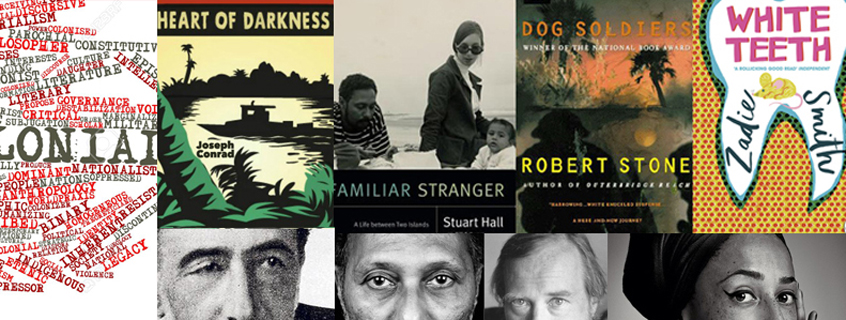
- This event has passed.
Globalization and Writing

Exploration: Exploitation/Domination • Discovery/Liberation
4 Works • 11 Weeks
The MEP Literature Group
In this eleven-week session we will read one memoir and three novels that study the scope of empire. Written between 1899 and 2000, the authors, two sailors (Polish and American), a Jamaican social theorist, and a British Jamaican immigrant are denied privilege because of their citizenship (or lack of it), class, or color. Unwilling, or unable to conform and accept lesser positions in their societies, they remain within their marginality and write their unease in novels which give readers an alternative report of the results of colonization both abroad where the EuroAmerican capitalists have colonized and what consequences that colonization has made for life in the home countries.
Heart of Darkness
Joseph Conrad
The story, written at the height of the British Empire, reflects the physical and psychological shock Conrad himself experienced in 1890 when he worked briefly in the Belgian Congo. The experience left him disillusioned, questioning what it meant to be civilized in the age of colonialism
This novella is astonishingly powerful and equally enigmatic. Its condemnation of Western imperialism—of the greed, violence, and exploitation that so often accompanies ventures to bring “light” and civilization to the “dark” and needy areas of the world—and its poignant look at the destructive influence of colonization on the colonized and colonizer alike, have been widely praised. However, some postcolonial African writers, most notably Chinua Achebe, deemed the book racist for its portrayal of native African cultures.
Familiar Stranger: A Life Between Two Islands
Stuart Hall
Familiar Stranger takes us only as far as the mid-1960s, after a decade during which, for Hall, “normal” life was suspended in favour of non-stop political agitation. The book touches on his role in the New Left; his critical involvement with CND; his early exposition of the “formal” and “unwitting” variants of British racism; and the importance of Catherine, with whom he relocated to Birmingham at the start of his lifelong embrace of cultural studies. These recollections of a busy life in Britain nonetheless remain haunted by the ghostly presence of his earlier years in Jamaica. With its resonant subtitle, A Life Between Two Islands, it encourages the reader to draw such parallels as that between Jamaica’s 1938 rebellion and the Brixton riots of 1981. It was Hall’s belief that the British had never fully come to terms with colonialism and decolonization.
Dog Soldiers
Robert Stone
Dog Soldiers deals with the fall of the counterculture in America, the rise of mass cynicism and the end of the optimism of the 1960s. California has moved on from the Summer of Love to post-Manson paranoia. Converse, a once-promising writer now unable to do more than observe, waits for artistic inspiration as a correspondent in Vietnam. Symbolic of his moral corruption is his decision to traffic in heroin, which the 1960s counterculture never embraced as they did marijuana and LSD.
White Teeth
Zadie Smith
This may be the first novel ever written that truly feels at home in our borderless, globalized, intermarried, post-colonial age, populated by “children with first and last names on a direct collision course.” Published when Smith was just 24, White Teeth follows the friendship of two Londoners, a pub-going working-class bloke named Archie and a Muslim from Bangladesh named Samad. Archie marries a Jamaican; Samad has twin sons, one of whom becomes a religious militant, the other a rabid Anglophile. The overlapping fates of Smith’s characters seem to trace the new structures of 21st-century life and test their sturdiness as framework for peace and happiness. Both deeply Dickensian and playfully post-modern, White Teeth doesn’t quail before the rampantly ramifying novelistic complexities of a multicultural world. It revels in them.
The MEP LITERATURE GROUP has been meeting to discuss literature since the first days of The Marxist Education Project following a presentation by Roxanne Dunbar-Ortiz on her Indigenous Peoples History of the United States and her recommendation that we take up literature with Leslie Marmon Silko’s Almanac of The Dead. The group has recently completed readings of Victor Serge’s Unforgiving Years following by Thomas Pynchon’s Gravity’s Rainbow. Our second summer of noir, considered works by Hammett, Chandler, Manchette, and others. Other studies have included novels related to World War I, the global depression of the 1930s, and novels on border politics, migrations and labor organizing.
